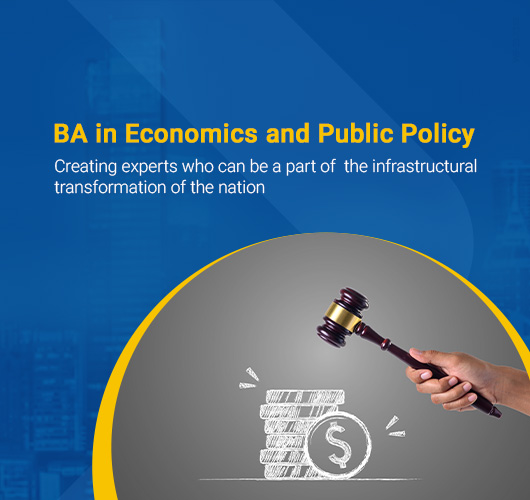Bachelor of Arts in Economics and Public Policy
Course Code : 1A05
BA in Economics and Public Policy is a rigorously designed programme in economics with the right blend of public policy. Laying a strong foundation in economics and quantitative techniques, the programme is also infused with the flavour of liberal arts encompassing creative writing, storytelling, philosophy, etc. Through numerous group talks and interactions with thought leaders, media professionals, public policy experts and practitioners, this balanced programme prepares you for higher studies and gives access to a broad range of roles. The involvement of private sectors in social and infrastructural development and the vibrant media glare for public policy and economics have resulted in immense interest in public policy among students. The programme caters impeccably to this interest and carves strong career paths for students.
Highlights
Provides a strong foundation in economics and public policy
Exposure to the extensiveness of liberal arts subjects and soft skills
Opportunity to specialise in one of the three tracks of Technology and Entrepreneurship, Entrepreneurship and Academic Wiring, and Research and Academic Journalism
Understanding of national and international perspectives
Analytical skills and soft skills like entrepreneurship, communication, and social intelligence
Exposure to development programmes and public service delivery
Interactions with politicians, policymakers, senior bureaucrats, international and national experts, thought leaders, media professionals, and civic society members
Understanding of institutional processes and functioning of government agencies using data to frame policies and manage programmes
Extensive research and consulting skills in studying public policymaking
Curriculum Structure
Term 1
- Micro Economics
- Mathematics for Economics
- Macro Economics
- English I
- Kannada I/ Sanskrit I/Hindi I/Additional English I
- Mind Management & Human Values I
- Research Methodology
Term 2
- Public Finance
- Statistics for Economics
- Indian Economics
- English II
- Kannada II/ Sanskrit II/Hindi II/Additional English II
- Mind Management & Human Values- II
Term 3
- Language II (2)
- Macro Economics
- Public Policy Analysis
- Entrepreneurship
- IT Applications
- Public Finance and Taxation
- Research Methods
Term 4
- Ethical Business
- Business Law
- Development and Welfare Economics
- Innovations & Venture Development
- Corporate Finance
- Indian Knowledge System
- Field Study of Programme Development
Term 5
- Introduction to Sociology
- Banking and Financial Markets
- International Economics
- Econometrics
- Elective Major 1
- Elective Major 2
- General Elective 1
Term 6
- Environmental Economics
- Policy and Programme Evaluation
- Introduction to Data Analysis
- Elective Major 3
- General Elective 2
- Electives Major 4
- Programme Study Paper
Term 7
- Critical Analysis & Academic Writing
- Time Series and Forecasting
- Elective Major 5
- Elective Minor 1
- General Elective 3
- Elective Minor 2
- Policy Study: Field Work
Term 8
- Governance
- Elective Major 6
- Electives Minor 3
- Electives Minor 4
- General Elective - 4
- Policy Dissertation
Technology and Entreprenuership
- Technology Policy
- Data Analytics
- IT and Society
- Digital Marketing
- Digital Governance
- Time Series and Forecasting
- Visualization and Reporting
- Adv Econometrics
- Digital Media
- Venture Capital Market
Entrepreneurship
- Investment Analysis
- Inclsuive Bus models
- Social Entrepreneruship
- International Finance
- Industrial Economics
- Agro business
- Marketing
- Entre and Development
- Insurance
- Venture Capital Market
- Innovations and Product Development
- Sports Management
- Digital media
- Banking Operations and Market Regulations
Research and Economic Journalism
- Real Estate
- Urban Dev
- Climate Economics
- Infrastructure Economics
- Law and Economics
- Economics of Education
- Game Thoery
- Adv Econometrics
- Health Economics
- Insurance
- Advanced banking
- Agricultural Economics
- Tourism Development
- History of Economic Thought


Career Prospects
The programme is designed to extend wider options to choose from careers in private and public sectors such as:
Management consulting firms
Central and State Governments
Government bodies like NITI Aayog
Policy positions in Corporates
IT and Infrastructure Firms engaged with
the Government
Think-tanks and Industry Associations as researchers
and consultants
International Agencies and NGOs as researchers and consultants
Media houses as Journalists, analysts, and
content providers
FAQ's
Who is the father of Public Economics?
Arthur Cecil Pigou is considered the ‘Father of Public Economics’ for his work on welfare economics and government intervention.
What is the scope of Public Policy?
Public Policy covers laws, regulations, and government actions that address social, economic, and political issues.
What is called economics?
Economics is the study of how people, businesses, and governments use resources to meet needs and wants.
Is Public Policy a good career?
Yes. Public Policy is a good career option as it offers diverse job opportunities in government, NGOs, and businesses and has a strong impact on society.
What is the significance of Public Policy?
Public Policy is of immense significance. Public Policy experts contribute to framing policies that shape a better society. Effective policies also contribute to the welfare of the public.
What is the concept of Public Policy?
Public Policy refers to government strategies and actions specifically addressing different public concerns. Overall, Public Policy helps improve society.
What is the concept of economics?
Economics studies the production, consumption, and distribution of goods and services to understand how economies work.













